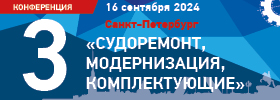Feeding neighbors
In 2017, the share of Russia’s foreign trade cargo transshipped via the ports of the Baltic states and Ukraine decreased by about 0.6% to 6.21%. At the same time, transshipment of Russian cargo via the ports of Ukraine surged over 2-fold amid the deficit of dry cargo handling facilities in the Russian Federation.
Ukraine
The share of Baltic states and Ukraine’s ports in the flow of Russia’s foreign trade cargo reduced mostly due to Baltic ports, which, according to RF Transport Ministry, handled 36.7 mln t of Russian cargo in 2017, down 13.8%, or 5.9 mln t, as compared with the result of 2016. Meanwhile, transshipment of Russian cargoes via the ports of Ukraine grew more than 2 times, by 5 mln t, to 9.7 mln t.
The increase was driven by coal (+ 5 mln t) and iron ore (+200,000 t) amid the heavy deficit of dry cargo transshipment facilities in the Southern Basin of Russia.
According to Victor Olersky, Deputy Transport Minister of Russia – head of Federal Marine and River Transport Agency (Rosmorrechflot), this region needs additional facilities for 53 mln t of cargo per year which are not covered by the current projects. This problem will be solved with implementation of the project on construction of Taman port’s dry cargo area designed for transshipment of more than 90 mln t. The project foresees the construction of sea terminals for transshipment of coal, sulphur, metal, mineral and fertilizers as well as terminals for transshipment of oil-bearing and bean crops.
Transshipment of oil products via the ports of Ukraine also doubled, due to low base effect though – from 300,000 t to 600,000 t. The market participants attribute it to the market situation.
Baltic states
In the Baltic Basin, the situation is better in relative terms but worse in absolute terms. Transshipment of Russian cargoes via the ports of the Baltic states decreased, except for iron ore, which grew by 400,000 t). Yet, that does not mean absence of dependence on foreign ports, it is still stable in the transshipment of coal (more than 16 mln t per year), mineral fertilizers (7 mln t per year), ore (about 2 mln t per year), ferrous metal (more than 2 mln t per year).
A drastic solution in the segment of coal and mineral fertilizers transshipment would be the construction of new dedicated deepwater terminals. However, the problem can be partially solved with redirection of Baltic cargo flows to Russia through containerization.
Yug-2 terminal at the port of Ust-Luga started handling containers with mineral fertilizers of Phosagro back in 2015. In 2017, Port Bronka (Saint-Petersburg) presented a project of a southern railway-yard for redirection of dry bulk cargo to Russia. The construction of the railway-yard is to begin in 2019. That will let take over 5-8 mln t of cargo from the ports of the Baltic countries, which is about 410,000-660,000 TEUs per year. Bottom discharge technology is supposed to be used as the most efficient method.
In the segment of oil cargo, Baltic ports handled 4.5 mln t of cargo, twice as much as in the previous year.
However, the largest oil terminals of Russia’s Baltic port were also involved in oil cargo transshipment. The port of Primorsk handled 13.57 mln t of oil products (-1%), Ust-Luga Oil terminal – 28.9 mln t (-5%).
On the other hand, Petersburg Oil Terminal demonstrated a 13-pct growth driven by expansion of the range of export products with kerosene (not handled by the terminal earlier) and the range of fuel oil grades.
Among the operators of Big Port St. Petersburg, the growth in transshipment of oil products was shown by Baltic Fuel Company (one of the largest bunkering companies in the port), which put into operation the Turukhtanniye Islands terminal with total capacity of 500,000 t.
In general, it can be said that dependence of Russia on the ports of the neighboring states is not high in the segment of oil cargo, and it is likely to decrease in the future. As for dry bulk cargo, especially coal, mineral fertilizers and ore, there is a deficit of dedicated facilities in Russia.
Vitaly Chernov






